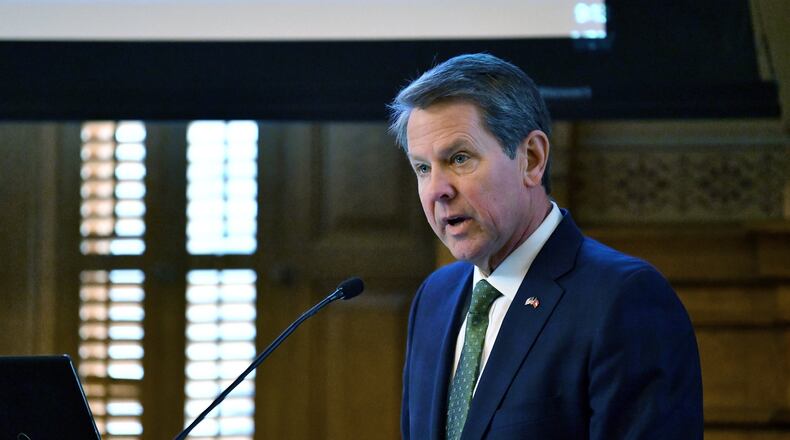Gov. Brian Kemp won't say whether Georgia will keep the door open to refugees days after a federal judge temporarily blocked a Trump administration order that gave state and local officials discretion over their resettlement.
The court's ruling halted a policy by President Donald Trump that required resettlement agencies to obtain written consent from mayors, county leaders and governors by Tuesday, when they were set to submit federal funding requests.
Kemp is among the last governors still on the sidelines. At least 42 states — led by a mix of Republicans and Democrats — have said they would allow refugees, and Texas earlier this month became the first state to say no.
The Republican has not commented on the plan, aside from suggesting he has more flexibility with his timeline. His aides indicate he's not likely to decide until the legal challenge is settled.
Documents obtained by The Atlanta Journal-Constitution show that Kemp is under pressure to join other governors, along with the city of Atlanta and several local governments, who have consented to allow refugees to resettle in the state.
Among the advocates are prominent conservatives who have urged the governor to roll out the welcome mat for the roughly 1,000 people fleeing persecution that the Coalition of Refugee Service Agencies estimates could be brought to Georgia this fiscal year.
“I have been actively involved in the issue through my church and serving on the board of a school that focuses on refugee children in our state,” former state Rep. Ed Lindsey, an Atlanta Republican and lawyer, wrote in a letter to Kemp’s top attorneys. “As such, I can attest first hand to its success in Georgia.”
Other supporters tried other tactics to influence Kemp’s decision. The Coalition for Refugee Service Agencies included a letter of sample consent language for the governor to fill out. The International Rescue Committee peppered him with postcards encouraging him to support the cause.
And the Georgia Restaurant Association said that refugees could help the industry cope with one of its most pressing challenges by filling positions left vacant amid plummeting unemployment rates.
“Many of our restaurants have employed refugees over the years, and these employees continue to be an important and valued part of our workforce,” wrote Karen Bremer, the association’s chief executive. “We are hopeful that these opportunities will continue in the future.”
‘Flies in the face’
Trump signed his executive order the same September week his administration announced that the number of refugees for this fiscal year would be capped at 18,000. That's the lowest in the history of the program and down from 30,000 in the fiscal year that ended in September.
At the time, he cast it as part of a commitment to let local officials “decide what is best for your own cities and for your own neighborhoods.” The policy was challenged in court by faith-based agencies who called it an unconstitutional violation aimed at the world’s most vulnerable people.
A federal judge in Maryland blocked the order last week, saying it does not “appear to serve the overall public interest” and that ceding federal authority on refugees to the states “flies in the face of clear congressional intent.”
The White House said the court ruling has “robbed millions of American citizens of their voice and their say in a vital issue directly affecting their communities.”
Kemp has faced political pressure from Trump supporters who want to curtail immigration and have reminded the governor of his tough talk about the issue on the campaign trail.
At the same time, Kemp has been lobbied to allow refugee resettlement by both conservatives and liberals who say Georgia has a moral obligation to help refugees.
"Resettling refugees affirms our country's moral values and strengthens our local communities," said state Rep. Bee Nguyen, an Atlanta Democrat whose parents fled from Vietnam and rebuilt their lives in the U.S. through the resettlement program.
“The executive order that was blocked would have done nothing but advance the federal administration’s anti-immigrant agenda in clear violation of congressional intent and our country’s long tradition of welcoming refugees,” Nguyen said.
The refugees who are admitted to the U.S. go through an intense, years-long screening process. No matter Kemp’s decision, he can’t block refugees from moving to the state once they have resettled in America. They are permitted to move wherever they choose once they’re legally admitted to the U.S.
Last fiscal year, 1,189 refugees resettled in Georgia, up from 837 the year before. The largest numbers last year came from Afghanistan, the Democratic Republic of Congo, Eritrea, Myanmar and Ukraine.
Keep Reading
The Latest
Featured




